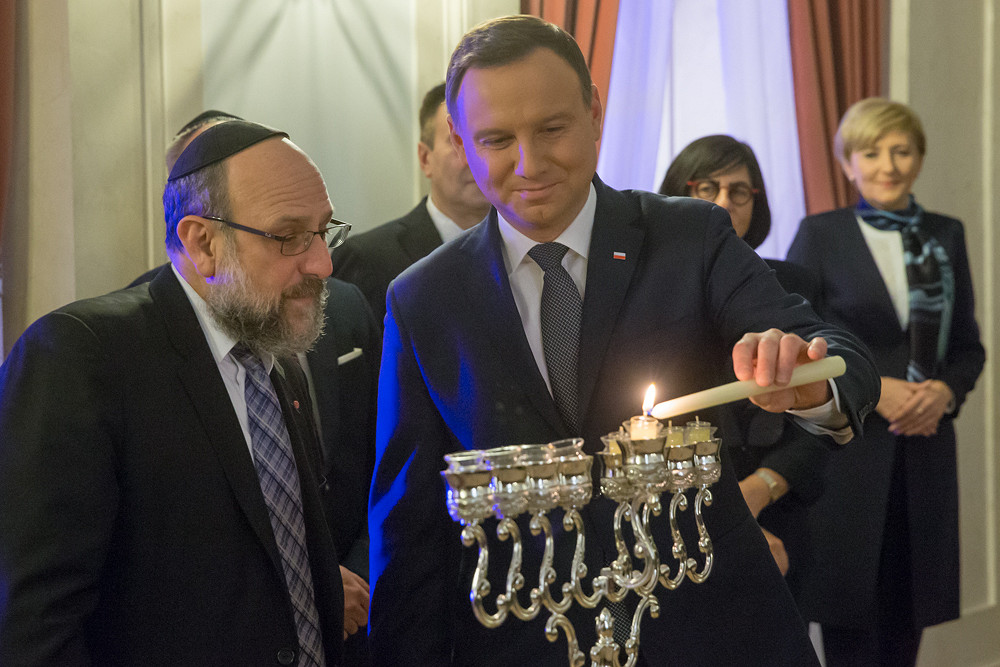Keep our news free from ads and paywalls by making a donation to support our work!

Notes from Poland is run by a small editorial team and is published by an independent, non-profit foundation that is funded through donations from our readers. We cannot do what we do without your support.
The presidential candidate supported by Poland’s main conservative opposition party, Law and Justice (PiS), has said that, if elected, he would end the longstanding annual tradition of lighting Hanukkah candles with Jewish leaders in the presidential palace.
The practice was started in 2006 by the late President Lech Kaczyński, who founded PiS alongside twin brother Jarosław, the party’s leader. It was continued by subsequent presidents, including the current incumbent, Andrzej Duda (pictured above), who is also from PiS. None were Jewish.
In an interview with broadcaster RMF, Karol Nawrocki, a non-party candidate for the presidency supported by PiS, was asked if he would continue the tradition.
“No,” he replied. “I take my attachment to Christian values seriously, so I celebrate holidays that are close to me as a person.”
🇵🇱 "Czy zapali Pan świece chanukowe, jako Prezydent Polski?"@NawrockiKn : "Nie!…"
Czas pokaże, jeśli wygra wybory😐 pic.twitter.com/pXKFAk4bkQ
— Mycha 🇵🇱🐁💨 (@Myszeg_Cki) January 12, 2025
Before the Holocaust, Poland was home to around 3.5 million Jews, roughly 10% of the country’s population. Now, however, the community numbers only around 16,000, according to the most recent census.
The question of lighting Hanukkah candles in public spaces came under discussion in December 2023, when a far-right MP with a long history of antisemitism, Grzegorz Braun of the Confederation (Konfederacja) party, attacked a ceremony being held in parliament to light a hanukkiah.
His actions were condemned across the entire political spectrum apart from the far right. When, two days later, a new Hanukkah ceremony was organised in parliament, many leading politicians attended, including President Duda.
Jewish leaders and politicians from across the spectrum, including the president, joined a ceremony in parliament to light the Hanukkiah that was put out with a fire extinguisher by a far-right MP.
“This is the true face of Poland,” said the chief rabbi https://t.co/y3rLLqvuBn
— Notes from Poland 🇵🇱 (@notesfrompoland) December 14, 2023
Nawrocki, who currently serves as head of the Institute of National Remembrance (IPN), a state history body, has never previously stood for elected public office and was a relatively little-known figure when unveiled by PiS as its candidate in November.
His comments regarding Hanukkah are the latest in a series over the last week that have made clear that Nawrocki holds views that are conservative even by PiS’s standards.
Last week, he declared that as president, he would veto any bill softening Poland’s near-total abortion ban. He said that, while he recognises “that Poland is made up of people with different sensitivities”, he himself, as a “Christian and a Catholic”, is “pro-life from conception to natural death”.
By contrast, some leading figures in PiS, including former Prime Minister Mateusz Morawiecki, have admitted that pushing for the near-total abortion ban – which was introduced while they were in office – was a “mistake” and contributed to their defeat in the 2023 elections.
"I currently do not envision Ukraine in either the EU or NATO," says the presidential candidate of Poland's conservative opposition PiS party.
He also pledged to veto bills ending the near-total abortion ban or introducing same-sex civil partnerships https://t.co/GNcXnAx5r0
— Notes from Poland 🇵🇱 (@notesfrompoland) January 9, 2025
In order to win the presidency, a candidate must claim more than 50% of the vote – either in the first round, which will take place on 18 May, or in a second-round run-off between the top two candidates.
In polling, Nawrocki is currently the second-most popular candidate, with support of 25-30%. The frontrunner is Warsaw mayor Rafał Trzaskowski, the candidate of Poland’s main ruling group, the centrist Civic Coalition (KO), who has 35-40%.
With the hardline positions Nawrocki has outlined so far – including expressing doubt about Ukraine’s accession to the EU and NATO – he may find himself competing for voters with Sławomir Mentzen of Confederation, who is third in the polling with around 10-11%.

Notes from Poland is run by a small editorial team and published by an independent, non-profit foundation that is funded through donations from our readers. We cannot do what we do without your support.
Main image credit: KPRP

Daniel Tilles is editor-in-chief of Notes from Poland. He has written on Polish affairs for a wide range of publications, including Foreign Policy, POLITICO Europe, EUobserver and Dziennik Gazeta Prawna.



















